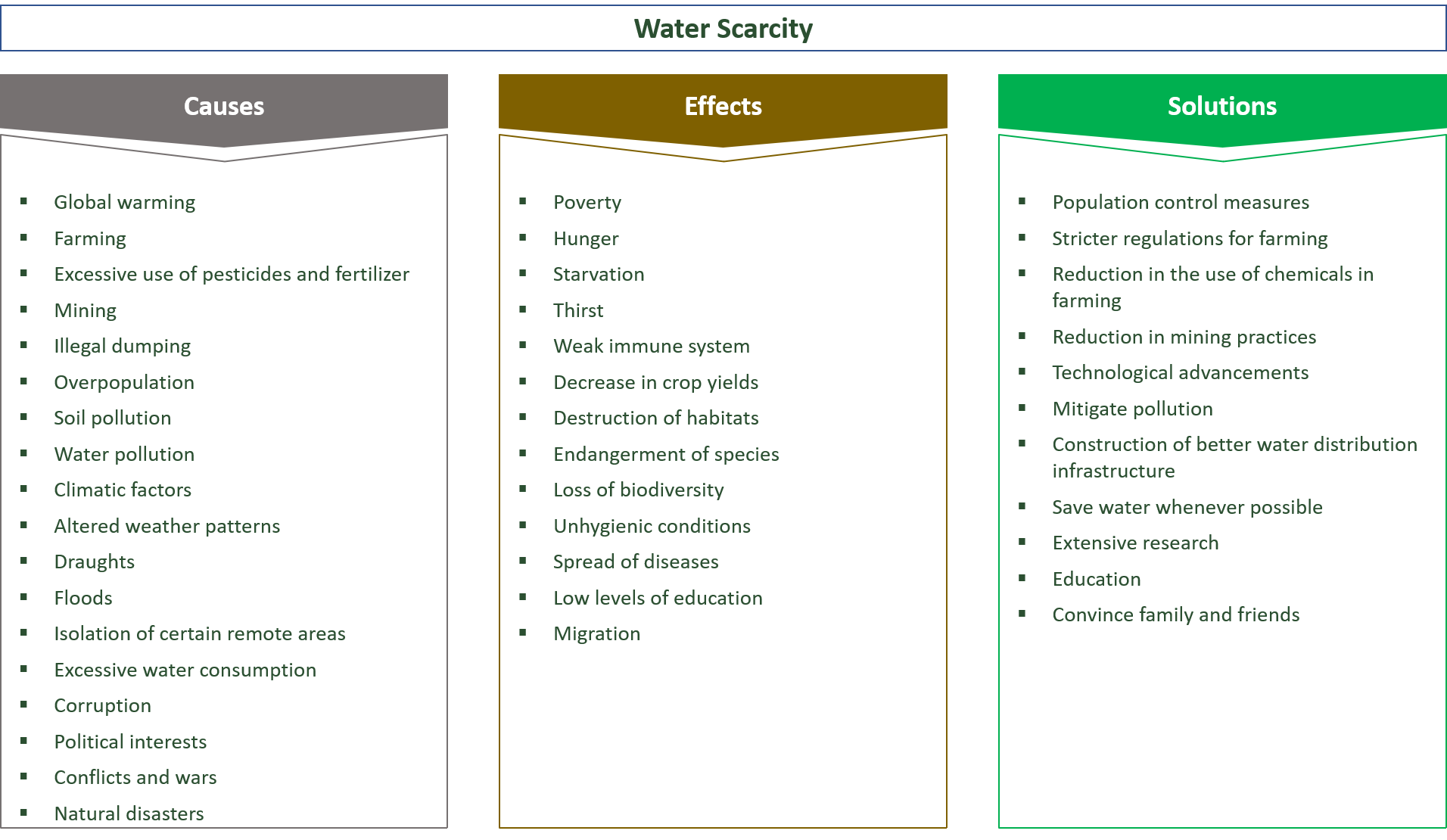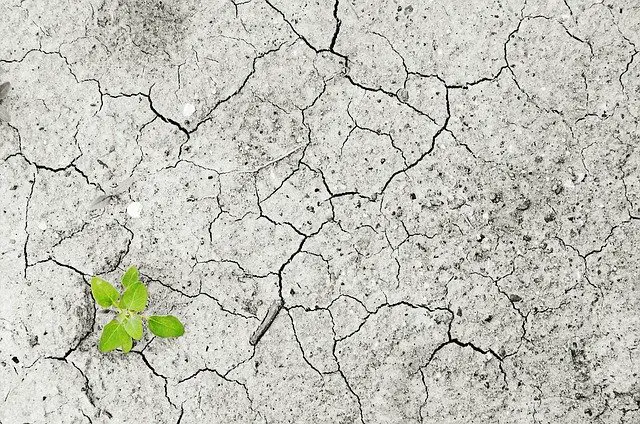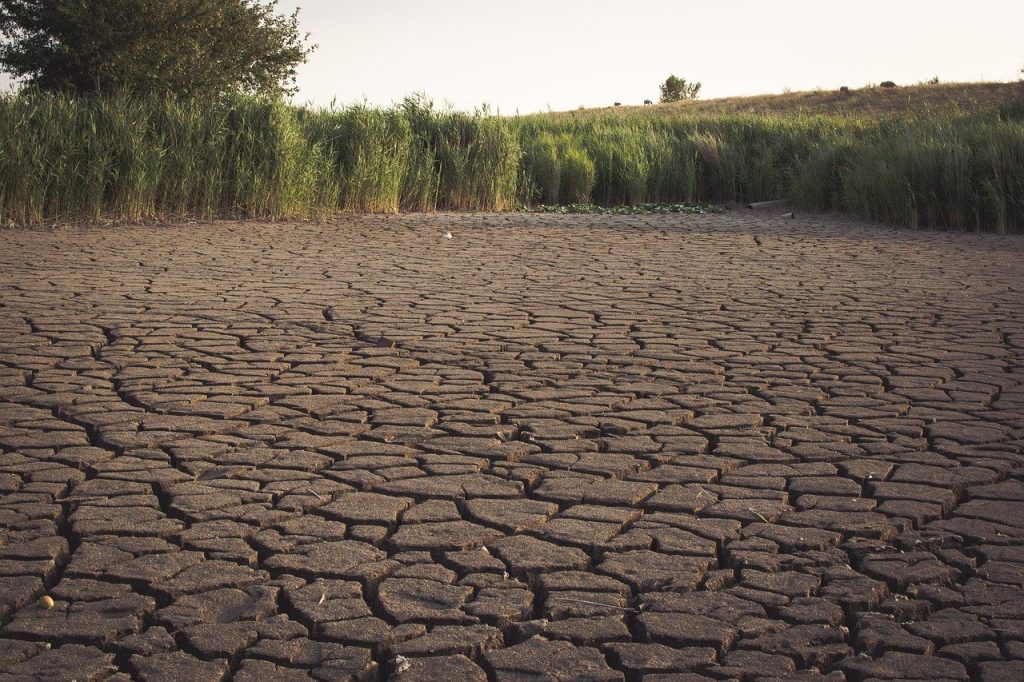“We have serious challenges regarding climate change, unsustainable use of natural resources, water scarcity, loss of biodiversity, forests and farmland. Not to mention the huge inequality still prevailing in several parts of the planet.”
Guilherme Leal, Businessman
Water Scarcity: Causes, Effects & Solutions

Water scarcity (sometimes also referred to as water shortage) can be defined as a lack of freshwater resources.
Especially in poor countries in the Southern hemisphere, water scarcity can lead to serious problems and may cause the loss of livelihood for many people, who may be forced to migrate to foreign countries in order to survive.
In this article, the extent, causes, effects and solutions for the water shortage issue are examined.
Audio Lesson
Contents
Extent of Water Scarcity worldwide
According to the WWF, on a global scale, more than one billion people worldwide suffer from serious water shortages all over the year.
2.7 billion people suffer from water scarcity for at least one month a year.
Therefore, water scarcity can be regarded as one of the biggest global problems humanity faces in current times, which may become even worse due to global warming.
Scientists estimate that until the year 2025, shocking two-thirds of the global human population may suffer from water scarcity.
Causes for Water Scarcity
- Global warming
- Farming
- Excessive use of pesticides and fertilizer
- Mining
- Illegal dumping
- Overpopulation
- Soil pollution
- Water pollution
- Climatic factors
- Altered weather patterns
- Droughts
- Floods
- Isolation of certain remote areas
- Excessive water consumption
- Corrupt political systems
- Political interests
- Conflicts
- Natural disasters
Global warming
One important cause of water scarcity is global warming.
When our average air temperature becomes warmer, water from rivers and lakes evaporates faster, which may contribute to the draining of water bodies.
In turn, people who rely on those water bodies for drinking water or also for transportation purposes will significantly suffer from the consequences of global warming regarding the local water supply.
Farming
Farming can also be a cause for water scarcity since for the irrigation of fields, large amounts of water are necessary, especially in hot and dry areas where there is not sufficient rainfall for agricultural purposes.
In those regions, if farmers use large amounts of water, there could be water shortages for the rest of the local population.
Excessive use of pesticides and fertilizer
Farmers also often use plenty of fertilizers and pesticides in order to maximize their crop yields.
However, the excessive use of those chemical substances may pollute the soil and in turn may also pollute the groundwater, which may lead to serious water shortages for the local population in the long run.
Mining
Since for mining purposes, large areas of land have to be used and processed, local rivers may become polluted or altered in their natural flowing pattern.
In turn, villages close to these rivers may suffer from severe water shortages.
Illegal dumping
Another significant reason for water shortages may be illegal dumping. In many countries, there are still quite lax regulations and control mechanisms regarding illegal dumping.
Therefore, industries frequently dispose of their industrial garbage in nearby rivers and lakes since it is an easy and cheap way to get rid of this waste.
However, this may in turn lead to serious water pollution, which may result in severe water scarcity for people who rely on the water supply from those water bodies since they may no longer be able to use the water due to the high pollution levels.
Overpopulation
Our world population grows at an alarming rate.
Although some economies may benefit from this population growth, it also implies an increase in overall pollution and waste production.
Moreover, the overall consumption will increase, which in turn implies an increase in the emission of greenhouse gases and in turn contributes to the acceleration of global warming.
An increase in the average air temperature likely leads to serious water shortages for millions or even billions of people worldwide.
Soil pollution
Through soil pollution due to agricultural processes or illegal dumping, also our groundwater can become polluted since harmful substances in the soil will be eventually washed through the soil into our groundwater through rainfalls.
In turn, locals who rely on clean groundwater to ensure their water supply will suffer from serious levels of water scarcity, especially if there is no alternative water supply in place.
Water pollution
In regions where the water in rivers or lakes is quite dirty, locals often suffer from severe water shortages since they are not able to use this water from water bodies.
Instead, they often have to rely on rainwater.
However, in periods where there is no rainfall, locals may be in serious trouble since their water supply may break down.
This is especially true for remote regions where people are not connected to public water lines.
Climatic factors
The climate plays a big role in the extent of water scarcity.
For instance, in quite hot and dry regions in the Southern hemisphere of our planet, water scarcity is a much bigger problem than in countries with steady rainfalls in the Northern hemisphere.
Therefore, people living in hot and dry climatic zones will suffer much more from water shortages.
Altered weather patterns
Our global weather patterns change over time, meaning that the level and frequency of rainfalls and droughts may greatly vary over the course of decades.
This in turn may also contribute to water shortages since if people are surprised by droughts, they may not have built up a water supply and may suffer from serious water scarcity in those periods.
Droughts
Droughts may be another significant cause of water scarcity.
Especially in hot and dry regions of our planet, droughts are quite common.
However, droughts may severely lower the groundwater level, which may in turn make it impossible for people to get water from fountains.
If these fountains are peoples’ single source of water supply, they may suffer from severe water shortages and from the resulting adverse effects.
Floods
Even though this may sound not quite intuitive, floods can also contribute to water shortages.
Floods may lead to serious pollution of local water bodies since large amounts of soil are moved.
Therefore, after floods, local rivers may no longer be suitable for drinking water purposes for a certain period of time.
Moreover, public infrastructure may also be destroyed by floods, which may further contribute to local water shortages.
Isolation of certain remote areas
In quite remote areas where people do not have any connection to the outside world, droughts and other adverse natural events may lead to serious water scarcity for those people since they are often not connected to public water supply and may have to rely on their own water supply.
If this water supply breaks down due to natural events, those people may suffer from serious water scarcity.
Excessive water consumption
In some areas, water is even wasted.
For instance, large amounts of water are used to irrigate the lawn and keep it nice.
Moreover, people take long showers which also leads to the consumption of large amounts of water.
Especially in areas where water is a quite scarce resource, this could lead to water shortages for the poor local population which may no longer be able to get sufficient water to ensure their basic water demand.
This problem is especially severe in poor countries where guests in luxury hotels in the middle of the desert consume plenty of water, while many locals suffer from severe water scarcity.
Corrupt political systems
Especially in countries where corruption is a big problem, the bribing of officials may also contribute to water scarcity of the local population.
For instance, if water is a scarce resource, locals may have to pay a fee to government officials in order to get enough drinking water.
However, this means that the poor part of the local population may not be able to get sufficient water since they simply have not enough money to bribe government officials.
Political interests
In some countries, water scarcity is even used as a tool by politicians to control and sustain their power.
By keeping the local population poor and dependent on the government water supply, they are able to sustain their power.
Conflicts
Conflicts may also contribute to water scarcity for locals. Conflicts may lead to the destruction of important local infrastructure, which may lead to disruptions of the water supply for many people.
Moreover, if some extremist groups control the local water supply, people who have different political attitudes may also greatly suffer from water shortages since extremist groups may not supply them with water due to their different world ideologies.
Natural disasters
Natural disasters like tsunamis may also cause severe water shortages for the local population since these events may destroy important public infrastructure.
In turn, depending on the severity of the natural disaster, the local water supply may entirely collapse.

Effects of Water Shortages
- Poverty
- Hunger
- Starvation
- Thirst
- Weak immune system
- Decrease in crop yields
- Destruction of habitats
- Endangerment of species
- Loss of biodiversity
- Unhygienic conditions
- Spread of diseases
- Low levels of education
- Migration
Poverty
Water scarcity can lead to extreme levels of poverty.
People who suffer from water shortages may not be able to work since their bodies will not function in a normal manner.
Moreover, also their brain may suffer since water is crucial for the healthy development and functioning of our mental capacities, which in turn may also lead to a significant decrease in productivity.
As a result, people who suffer from water scarcity also often suffer from a lack of education and unemployment, which may trap them in poverty.
Hunger
Water shortages may also lead to severe levels of hunger for the local population.
Especially in poor developing countries, whole villages often rely on local farmers in order to get enough vegetables and fruits to survive.
However, if the crop yields of these farmers suffer due to droughts or other events that cause shortages in water, many people may suffer from hunger since they may not find alternative food sources.
Starvation
In extreme cases, water scarcity may result in starvation, which may even lead to death for many people if the water shortage is severe enough.
Our body needs a minimum number of calories, otherwise, it will eventually collapse.
Thirst
Insufficient water supply will also cause severe levels of thirst for the local population.
In turn, this can lead to serious mental as well as physical issues, since water is crucial for our body and brain to function in a proper manner.
Weak immune system
In order to fight bacteria or viruses, our body needs to be in good shape.
However, if our body suffers from water shortages, it may not be able to sustain a strong immune system and may become more vulnerable to diseases.
This is the reason why in poor developing countries, diseases that are considered to be rather harmless in the Western world can even result in death for the local population, since their bodies often suffer from food and water scarcity and may therefore too weak to defend against diseases.
Decrease in crop yields
Water scarcity often leads to significant drops in crop yields, which in turn may lead to the loss of livelihood for many farmers.
Moreover, also locals who rely on those crop yields as a main source of food supply may greatly suffer from declines in crop yields.
Destruction of habitats
If water scarcity is persistent over a longer period of time, it may also lead to the destruction of whole habitats. Water is crucial for all life forms on our planet.
Therefore, a long period without rain may lead to a state where animals and plants may no longer be able to get enough water and may therefore die or have to move to other regions.
Endangerment of species
Many animals and plants may also become endangered or even extinct due to water shortages.
This is especially true when it comes to animals and plants that only occur in a few or just a single region of our planet.
If these regions suffer from severe water shortages, chances are that some animals and plants may become extinct since they simply starve or die of thirst.
Loss of biodiversity
In general, shortages in water cause serious biodiversity loss.
Many plants may no longer be able to grow and reproduce in a sufficient manner in order to sustain their population.
In turn, many species, especially those who are sensitive to water shortages, may die off and only some plant species that do not need much water may sustain themselves.
Unhygienic conditions
Since we need water for several tasks in our daily life, a shortage in water usually results in quite unhygienic conditions.
For instance, without water, people are not able to shower.
Moreover, also toilets will not work in a proper manner.
Spread of diseases
Due to these unhygienic conditions, there may be a serious spread of diseases in those regions.
People are likely to carry around bacteria and infect other people.
In severe cases, these diseases may even spread across borders, which may even lead to pandemics.
Low levels of education
Water scarcity may also contribute to low levels of education for the local population.
Since without sufficient water, our brain is not able to function in a proper manner, many school kids will not be able to learn and grow their knowledge in a sufficient way.
Moreover, some kids will also not be able to attend school since they have to work and make money in order to ensure the family’s water supply.
Migration
Water scarcity may also lead to migration waves.
This will be especially true in the near future since due to climate change, large areas of land may no longer be suitable for farming and millions of people may lose their livelihood due to that.
These people may be forced to migrate to foreign countries in order to survive.

Solutions for Water Scarcity
- Population control measures
- Stricter regulations for farming
- Reduction in the use of chemicals in farming
- Reduction in mining practices
- Technological advancements
- Mitigate pollution
- Construction of better water distribution infrastructure
- Save water whenever possible
- Extensive research
- Education
- Convince family and friends
Population control measures
Since water scarcity can be caused by population growth, population control measures may mitigate the issue to a certain extent.
For example, with a one-child policy like introduced in China, we could lower the number of people on our planet in an entirely natural manner and could lower the water scarcity issue and several other environmental problems.
Stricter regulations for farming
In order to mitigate the issue of water shortages, there should be stricter regulations regarding farming practices in order to make it more sustainable.
This could mean that the amount of water that can be used for farming purposes, especially in hot and dry regions where water scarcity is a big problem, should be limited.
It could also mean that farmers avoid soil pollution in order to also avoid groundwater pollution.
Reduction in the use of chemicals in farming
In our current age, excessive levels of chemical fertilizers and pesticides are used in order to maximize crop yields.
However, this behavior leads to serious soil pollution, which in turn translates into groundwater pollution and contributes to the water scarcity issue.
Therefore, it is crucial that farmers reduce the use of chemicals for farming so that good water quality can be assured and the water shortage problem can be mitigated.
Reduction in mining practices
Since mining also contributes to several environmental issues, including water scarcity, it is crucial to limit mining activities in order to protect our rivers, lakes and also our groundwater from serious levels of pollution.
Thus, governments around the world should introduce regulations regarding mining limits.
Technological advancements
Our technological progress skyrocketed in the past decades.
With the help of artificial intelligence and other technological inventions, we may be able to reduce the water scarcity issue to a certain extent since this kind of technology could optimize the water consumption of irrigation plants, which could save plenty of water in the long run.
Moreover, AI may also be able to predict droughts or other adverse events related to water scarcity, which may lead to a better preparation of locals for such events and in turn may lower the adverse consequences.
Mitigate pollution
Especially in regions where water scarcity is a big issue, industries and hotels should try to save water whenever possible.
They should also try to reduce their overall pollution level so that the groundwater can be protected from pollution and the water scarcity issue can be lowered.
Construction of better water distribution infrastructure
Many people worldwide, especially in poor developing countries, are still not connected to the public water infrastructure.
These people often solely rely on fountains to meet their water demand.
However, in case of droughts when fountains may not work anymore, these people are in great danger to suffer from severe water shortages.
By connecting these people to the public water supply, the risk for water scarcity could be greatly reduced.
Save water whenever possible
Especially if you take vacations in countries where water shortages are a big issue, try to save water whenever possible.
This could mean limiting the use of washing machines. It could also mean to take short showers instead of full baths.
Extensive research
It is crucial that we enhance our global scientific understanding of water scarcity so we can take appropriate and effective measures to fight the issue on a global scale.
For this goal, extensive research and global collaborations are needed in order to find global solutions for the water crisis.
Education
It is also crucial to educate the general public about the water scarcity issue.
Many people might still not be aware that water shortage is killing or may kill millions of people in the future.
Therefore, it is crucial to educate children, but also grownups about the issue and to show them measures of how we can fight water scarcity in an efficient manner.
Convince family and friends
Apart from saving water whenever possible, you should also try to convince your family and friends to also join these efforts.
By doing so, you can multiply your positive effect on our environment.
Conclusion
Water scarcity is a significant environmental problem, which will become even worse in the future due to global warming.
Therefore, it is crucial that governments all over the world work together and find solutions for the issue.
Moreover, everyone of us should try to save water to make his or her contribution to ensuring a livable future for millions or even billions of people worldwide.
Sources
https://en.wikipedia.org/wiki/Water_scarcity
http://www.fao.org/3/a-i5604e.pdf
https://www.worldwatercouncil.org/en/water-crisis
https://www.worldwildlife.org/threats/water-scarcity

About the author
My name is Andreas and my mission is to educate people of all ages about our environmental problems and how everyone can make a contribution to mitigate these issues.
As I went to university and got my Master’s degree in Economics, I did plenty of research in the field of Development Economics.
After finishing university, I traveled around the world. From this time on, I wanted to make a contribution to ensure a livable future for the next generations in every part of our beautiful planet.
Wanna make a contribution to save our environment? Share it!